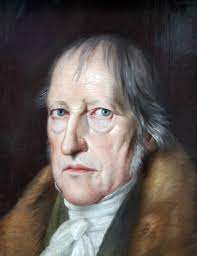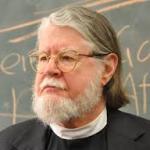Strange Bedfellows: Hegel and Kierkegaard
My immediately preceding post was about Hegel’s revolutionary idea of God as subject rather than substance. It was a reaction against Protestant (and Catholic) scholasticism which had engaged in what we today call “ontotheology”—treating God as a thing, an object, to be examined by the human mind without personal involvement or commitment. Hegel didn’t go all the way with his insight; later theologians such as Karl Barth went further with it, partly with the help of Hegel’s nemesis Soren Kierkegaard.
Hegel did not fully develop his insight about God’s subject-nature. He engaged in a rational project of understanding God as “Absolute Spirit” embedded in history, coming to self-actualization through human culture.
Kierkegaard is almost always treated as a self-appointed nemesis of Hegel’s. (We’re not sure Hegel was even aware of Kierkegaard.) The “melancholy Dane” was furious at the ways in which Hegel’s disciples in the Danish Lutheran Church treated God as someone or something who could be known by reason. For them, “reason” often seemed more like thinking along with middle to upper class society without any personal involvement with the subject (viz., God).
Kierkegaard agreed with Hegel that God is subject rather than (more than) substance. But he believed Hegel did not think it through. For Kierkegaard it meant that God must be known as he reveals himself and that knowing God truly requires personal (subjective) involvement, passion, commitment. There is no neutral knowledge of God.
After Hegel and Kierkegaard Christian thinkers who agreed that God is more subject than substance split into two main groups—those who agreed more with Hegel and those who agreed more with Kierkegaard.
Counted among those who followed Hegel (more) is my own theology teacher Wolfhart Pannenberg. Pannenberg stressed that God is subject rather than substance; that God cannot rightly be treated as a “thing,” an object. God comes to us. How? Where? Through history. Historical reason is a God-given means of coming to know him. And God comes to know himself, actualizes, realizes himself in and through history. Pannenberg did not seem to see that he often fell into treating God as substance, object, because of his rationalism. However, he tried to overcome that by saying that real, true knowledge of God is eschatological. Only in the eschaton will God be known. God is known short of the eschaton through glimpses of the eschaton in historical events such as the resurrection of Jesus.
Pannenberg, however, was no scholastic Christian thinker. He agreed with Hegel and that strain of Hegelian thought after Hegel that saw, sees, God primarily as subject, not substance (object).
Kierkegaard’s following is better known, I suspect, because of Barth and Bultmann and other Christian thinkers often classified as “existentialist.” For them, God is not substance at all, not at all an object of thought, not objectifiable to knowledge, but only able to be known as he reveals himself and with personal involvement. There can be no neutral knowledge of God.
Pannenberg thought that there can be neutral knowledge of God but that “knowledge” is never “true knowledge” of God. We cannot really know God himself “from below,” as it were. We can find traces of God in nature and history that point toward God, but to “know God” requires personal commitment. But Pannenberg was allergic to subjectivism, especially of the existentialist kind, that divorced faith from reason. But, for him, the union of faith and reason is eschatological. And along the way to the eschaton God shows himself from ahead, so to speak, coming out of his hiddenness in the future to reveal himself even to reason through universal history.
I agree with Hegel and Kierkegaard that God is absolutely subject more than substance and with all of their followers that knowledge of God, true knowledge of the true God, requires personal involvement, faith, commitment. We cannot know God as an object. We ought not to objectify God. However, I agree with Pannenberg that there are traces of God in nature and history that reason can grasp and that belief in God is more reasonable than unbelief in God.
Mortimer Adler wrote “How to Think about God”—a sustained proof of the existence of God. But he stopped short of treating God as an object. I’m sure Kierkegaard and probably Barth would disagree. Treating God as an object (substance) would require believing that we can know much more about God than THAT he exists.
*Note: If you choose to comment, make sure you comment is relatively brief (no more than 100 words), on topic, addressed to me, civil and respectful (not hostile or argumentative), and devoid of pictures or links.*















